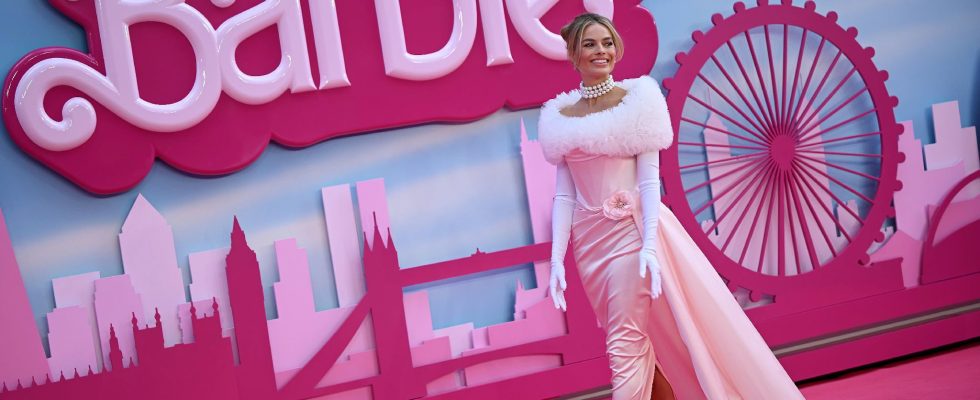It’s the story of a little music that has been playing in a loop since the start of the holidays and which, let’s face it, is starting to smell rancid. “Anti-Man Propaganda”, “the most woke movie I’ve ever seen”“freewheeling misandry”, “attack on public morals”, “horror show”… From American Republican conservatives to religious censors in the Middle East to some French observers, “Barbie” has raised a torrent of indignation since its theatrical release a month ago, rarely seen so far when it comes to a summer blockbuster whose script, let’s remember, is no thicker than a sheet of cigarette paper. So there are those who fear the disappearance of the male species and in the opposite camp those, or rather those, who vilify a pseudo-feminist film. Director Ovidie, for example, regret the absence of “Lesbian Barbie” when others defend “a real female brainwashing company”. Mattel, which experienced a complicated 2010 decade in terms of sales and image, nevertheless went to great lengths to recover its health by surfing the wave of “girl power”. Mattel and Warner (which distributes the film) have pulled out the heavy guns: with its 150 million dollars, the film’s marketing budget is higher than the cost of the film itself. At the helm, director Greta Gerwig, emblematic of post #MeToo cinema, who has a certain talent for rewriting history. You and I had always looked at Barbie as a superficial, plastic blonde with an unfailing smile and surreal measurements. Poor us, we didn’t understand anything. For sixty-four years, the world of Barbie is actually the cradle of feminism wants us to believe the American filmmaker, just 40 years old, four films on the counter including three Oscar nominations. In “Barbieland”, only women hold power and can become doctors, presidents or Nobel Prize winners in the blink of an eye, with men being relegated to the simple role of “himbos”. Add to this simplistic vision of female “empowerment” a peroxide Ken in need of love, concrete abs, fluorescent visor screwed on his head and you will hear all the paranoia of the woke threat crying out for the destruction of man ( not the one with a capital H, the other).
You still have to have easy indignation to see in this brilliant marketing campaign (since the release of the feature film, sales of Barbie dolls have jumped 20%), a danger for the West and its values. At worst, the film is (your choice) a disguised advertisement for Mattel, a guide to denouncing the patriarchy for dummies or a guide to personal development with the air of “it’s ok not to be perfect”. The operation is successful. Just three weekends after its release, Barbie topped $1 billion at the worldwide box office. A first for a director. This is perhaps where the only and true feminist dimension of the film resides. A woman, however talented she may be, can, like any great director – many have done it before her – give in to the sirens of the big Hollywood studios and put any artistic desire on hold. Barbie’s biggest drama isn’t that he poses a threat to the male gender. Or for that matter, for that matter. It’s because it’s a bad film with a lazy scenario, even contemptuous for the viewer who, because he’s looking for a moment of entertainment, doesn’t deserve better than an avalanche of dialogue worthy of a sitcom. AB Productions. Let’s not talk about the supporting roles, all bad. The only crime in this film? Having granted so much screen time to actress America Ferrera who since the end of the Ugly Betty series has obviously not taken a single acting lesson. This is the only reason for disappointment and weariness: Barbie is one more illustration of the decline of a Hollywood industry that no longer knows how to reconcile big budget and talent, the general public deserved better. Ratings given by viewers on movie sites speak for themselves.
Banned in Kuwait, Algeria…
For the rest, those anxious about the male condition can be reassured. Men will outlive Barbie. They will nonetheless be men because the character of Ken shows some signs of vulnerability and spends 1h55 attracting the attention of a Barbie who is indifferent to any attempt at rapprochement. The only actor who emerges unscathed from this film is the brilliant Ryan Gosling, who does not hesitate to make fun of his virility and to inject a dose of absurdity into this feature film lacking in humor. The film should not have been called Barbie but Ken as the character steals the show from his doll friend.
Before shouting anti-man propaganda, let Barbie’s most vocal critics be careful not to end up in spite of themselves on the same battle line as countries like Kuwait, which banned the film for “undermining traditions “, Algeria which has just withdrawn it for “attacking morality” or Lebanon which wishes to do so because it “promotes homosexuality”. You really have to be called Hezbollah to see Barbie as a pro-LGBT campaign, as no character or passage in the film depicts any form of homosexuality whatsoever. In China, where the film triumphs, its enemies accuse it of “promoting Western propaganda”. In Afghanistan, Afghan women have been going through hell for just two years since the return of the Taliban. As imperfect as it is, let’s prefer a world in which women have the right to wear high heels and big clogs to make fun of men, to a society that erases them from the public space. In a Western society that grinds black from morning to night and does not measure the chance it has to live in a world of freedom, let’s not be afraid of this candy pink wave that is breaking before our eyes. As the character of Ruth, the creator of Barbie, concludes in the film, “humans have only one end, ideas are eternal”. Freedom, that’s a great idea. Even when it leads to a bad movie…
